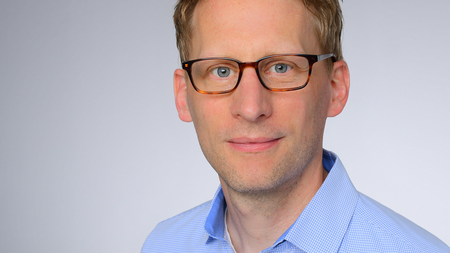Virologist Florian Klein appointed to the National Academy of Sciences
Prof. Florian Klein is a new member of the Leopoldina.
Prof. Florian Klein, scientist at the German Center for Infection Research (DZIF) and director of the Institute of Virology at University Hospital Cologne, has been accepted as a new member of the Leopoldina – National Academy of Sciences. The academy is thus recognizing Prof. Klein's scientific achievements in the field of virological and immunological infection research. Being appointed to the Leopoldina is considered a high honor for scientific excellence: new members are selected according to strict criteria in a multi-stage process.
"I am very pleased to receive this special award. Scientific findings are of great importance for progress and our common well-being. However, as can be seen from many current examples, this foundation can be endangered. I look forward to promoting the special role of science at the Leopoldina and disseminating scientific findings from my field of expertise to a wide audience," said Prof. Klein. Florian Klein's research focuses on the development of human B lymphocytes and their production of antibodies that target viral pathogens such as HIV, hepatitis C virus, Ebola viruses, and SARS-CoV-2.
In this context, he is developing so-called broadly neutralizing monoclonal antibodies that can be used to prevent and treat infectious diseases. Together with his team and collaborating research groups, he is translating his research findings into new applications for clinical use in patients.
Prof. Klein also conducts research on antibody-based therapies at the DZIF and coordinates the bridging topic of the same name, in which scientists from several fields discuss the latest findings, as monoclonal antibodies have great potential for effective use in the protection and treatment of infectious diseases. In order to meet the major infectious disease challenges of our time and to be able to quickly apply research results outside the research context, the DZIF has established interdisciplinary groups and bridging topics. This is because many problems can only be solved when expertise from different disciplines is brought together. Regular workshops are held to define and coordinate the research needs for the respective bridging topics.
About Prof. Florian Klein
Prof. Klein studied medicine in Cologne, Zurich, Bologna, and Boston from 1998 to 2005. After working as a resident physician at the Clinic I for Internal Medicine in Cologne, he moved to Rockefeller University in New York in 2009. Here he specialized in research on the human immunodeficiency virus (HIV) and the possibilities of antibody-mediated vaccination and therapy, and was appointed Assistant Professor of Clinical Investigation in 2013. In 2015, he accepted a DFG Heisenberg professorship in Cologne. Since 2017, Prof. Klein has been Chair and Director of the Institute of Virology at the University Hospital Cologne. He has received numerous awards for his scientific work, including the Georges Köhler Prize of the German Society for Immunology, the Prize for Translational Infection Research of the German Center for Infection Research, the German AIDS Prize, and the Heinz Ansmann Prize for HIV Research. In addition, Prof. Klein has been one of the world's most cited scientists in his field for several years.
About the Leopoldina
The National Academy of Sciences Leopoldina accepts researchers with a high level of expertise from various fields. It also represents German science abroad and advises politicians and the public on relevant scientific issues. To this end, it addresses current and long-term issues and develops well-founded statements and recommendations, independent of political and economic interests. This promotes dialogue between science, the public, and political decision-makers.
Source: Press release of the University Hospital Cologne (in German only)

